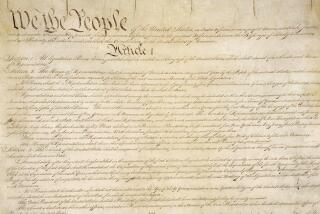Draft Democrats to help run Iraq
- Share via
PRESIDENT BUSH should spend less time worrying about the tangled politics of Iraq and more time mastering the equally fractured politics of Washington. The war in Iraq has become partisan — and partisan wars are impossible to fight successfully. The grim truth is that between the “thumping” his party took at the ballot box in November and the intrusive help of the Baker commission, the president has lost so much power at home that he can no longer maneuver successfully in Iraq.
How can he or his subordinates successfully negotiate with the bitter factions inside Iraq when his administration is seen as hobbled and when his ability to do much beyond withdrawing American forces is doubted? Indeed, the chief result of last week’s report from former Secretary of State James A. Baker III and his squadron of wise men has been to corner an already weakened president by proposing a general strategy of retreat and withdrawal, while remaining maddeningly opaque about how to go about it without delivering Iraq into the hands of its many budding civil-war makers.
War, as we all know, is an extension of politics, and before he can achieve anything in Iraq, the president must first quickly reestablish his political authority in Washington. Otherwise, his position will decline even further as the Democrats attempt to seize more control of Iraq policy. The squabbling and paralysis that would ensue is certain to send a very dangerous message of American weakness to the exactly the wrong people — not just in Baghdad and Fallouja but in Tehran and Pyongyang as well.
Bush likes to move boldly and preemptively. He would be well advised to do so right now by adopting a strategy that he would find immensely painful but that is the best option he has. He should trump the Baker commission by extending its bipartisan spirit to make the Democrats an offer no patriot can refuse: He should establish a bipartisan war council made up of his national security team and the Democratic leaders of the key national security committees in Congress.
Under the president’s leadership, this council would conduct the Iraq war, becoming the key coordinating vehicle for Iraqi policy. The president would not cede his authority as commander in chief, but he would work with this group — which would include such leaders as Sens. Joseph R. Biden Jr. (D-Del.) and Carl Levin (D-Mich.) and Reps. Ike Skelton (D-Mo.) and Silvestre Reyes (D-Texas) — to develop a consensus policy for Iraq.
Developing compromise inside such a war council would not be easy. The president would find ceding power a very bitter pill to swallow, and his Democratic critics would find that the Iraq war is much easier to criticize than to manage.
But only legitimate bipartisanship can give the president back the authority he needs to move diplomatically and militarily.
For example, most experts believe that the quickly deteriorating situation in Iraq needs to be immediately stabilized before a full-scale civil war overtakes events. Stabilization would probably require the direct application of military force against both Sunni insurgents and Shiite militia forces in a blunt assertion of U.S. power. It might even require a buildup of more U.S. troops in the short term. But undertaking any such offensive moves in Iraq would be impossible without at least some bipartisan support — and the Democrats are unlikely to grant that support without a true role in policymaking.
Some in the White House might argue that a power-sharing deal on Iraq with the Democrats is unnecessary. After all, the president — not the nagging Democrats on Capitol Hill — is the commander in chief. Winston Churchill, they might argue, would never have surrendered such control during the darkest days of World War II to shortsighted and defeatist critics.
Perhaps. But it’s worth remembering that Churchill, Britain’s determined prime minister, ran his war with a coalition war cabinet made up of leaders from all parties. He knew that successful war-waging and partisanship cannot coexist.
If the situation in Iraq continues to decline and the Democrats, excluded from participation, are allowed instead to rage along in an irresponsible campaign mode, the destructive gridlock over Iraq will get even worse.
Promises made by the Democratic majorities in Congress that they will not interfere with war appropriations are meaningless. Democrats now have congressional power, and they will use it. Far better for Bush to demand a partnership in the national interest, even if painful concessions are the necessary price. Far better to force the Democrats to accept the sober responsibilities that come with power than to keep them on the sidelines and become engulfed in a domestic political civil war over Iraq that the president no longer has the power to win.
The president could, in one statesmanlike gesture, end the paralysis in Washington, force Democratic maturity, reestablish his leadership and show our enemies American unity and resolve at a critical time for our nation. The public would reward it, and the national interest demands it.
More to Read
Sign up for Essential California
The most important California stories and recommendations in your inbox every morning.
You may occasionally receive promotional content from the Los Angeles Times.










